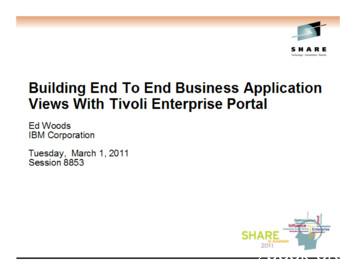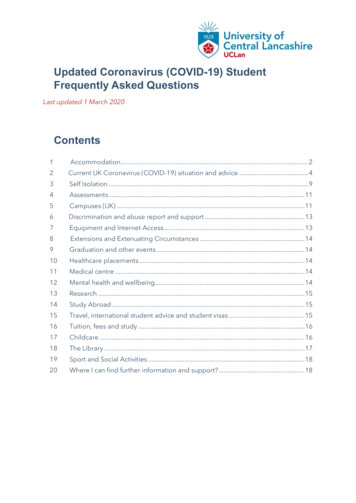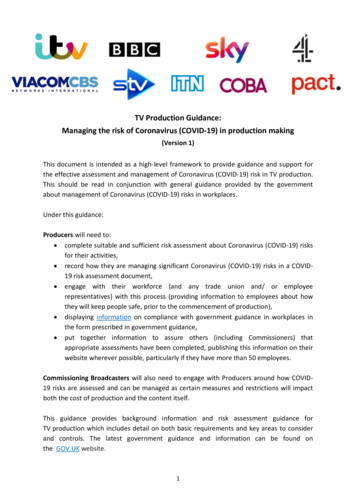Coronavirus Conspiracies And Views Of Vaccination
Coronavirus conspiraciesand views of vaccinationSunday 31 January 2021Supported by:
IntroductionThis report includes findings from a survey of 4,860 UK residents aged 18-75 bythe University of Bristol and King’s College London, conducted between 21November and 22 December 2020. Coronavirus conspiraciesNotable minorities of the population have conspiracy suspicions aboutcoronavirus, ranging from the relatively mild – such as that “people need to wakeup and start asking questions about the pandemic”’ (believed by 41%) – to themore extreme, including that “reporters, scientists, and government officials areinvolved in a conspiracy to cover up important information about the virus”(believed by one in seven [15%]).These kinds of beliefs may be contributing to uncertainty about getting acoronavirus vaccine among some sections of the population There appears to be a link between such suspicions and vaccine hesitancy. Forexample, while 28% of the public overall believe “legitimate questions aboutcoronavirus are being suppressed by the government, the media, and academia”,this rises to 61% among those who say they are unlikely to or definitely won’t geta coronavirus vaccine.Belief in more concrete conspiracy theories is also relatively widespread, with onein five people saying it’s true that “the authorities want us to think that coronavirusis much more dangerous than it really is” (20%) and that “the government isdeliberately allowing vulnerable people to die” (19%).Ethnicity and ageYounger people and people from ethnic minorities are more likely to haveconspiracy suspicions and believe conspiracy theories about coronavirus: 6% of those from white ethnic groups believe “Bill Gates wants a massvaccination programme against coronavirus so that he can implant microchipsinto people”, compared with 19% among those from other ethnic groups.26% of those aged 18 to 34 believe “an impartial, independent investigation ofcoronavirus would show once and for all that we’ve been lied to on a massivescale”, while 16% of people aged 55 to 75 say the same.Vaccine concernsPeople from ethnic minorities are much more likely to say that various concernsabout a coronavirus vaccine could probably persuade them not to take it. Forexample, 41% of people from white ethnic groups say potential concerns abouthow quickly a vaccine was developed are likely to deter them from getting it,compared with 58% of people from other ethnic groups who say the same.There are also significant differences in how quickly people of different ethnicbackgrounds and ages say they would like to be vaccinated.The link with where people get their information fromPeople who say they get a great deal or fair amount of their information oncoronavirus from certain online sources, including social media platforms, aresignificantly more likely to have conspiracy suspicions about the pandemic andthink various conspiracy theories are true.Relying on such sources is also associated with far greater levels of potentialconcern about getting vaccinated against coronavirus. For example, those whoget a lot of their information from DuckDuckGo (63%), WhatsApp (55%),Instagram (54%) and YouTube (49%) are more than twice as likely as both thepopulation overall and those who rely on traditional media sources to say thatthey would probably be put off getting a vaccine if there were concerns that itmight overload their immune system.
Conspiracy suspicions about coronavirusWhile they are minority beliefs, significant sections of the UK publicnonetheless have conspiracy suspicions about coronavirus and thehandling of the crisis.There appears to be a link between such suspicions and vaccinehesitancy, with those who say they’re unlikely to or definitely won’t get acoronavirus vaccine hugely more likely to hold these beliefs.People from ethnic minorities are also more likely than those from whiteethnic groups to hold these suspicions, and belief in them is largelyconcentrated among the young.
Notable minorities of thepopulation have conspiracysuspicions about coronavirus.Belief is particularly high inmilder suspicions, such as thatpeople need to wake up andstart asking questions about thepandemic – believed by 41% –and is much lower for moreextreme suspicions.But even these extremesuspicions are held bysignificant sections of the public.For example, more than aquarter of people (27%) think thereal truth about coronavirus isbeing kept from the public, andone in seven (15%) think theauthorities are involved in awidespread cover-up of keyinformation about the virus.Note: some figures differ from charts dueto rounding.To what extent, if at all, do you agree or disagree with the following statements?StronglyagreePeople need to wake up and startasking questions about coronavirus14%9%19%The real truth about coronavirusis being kept from the public9%18%Reporters, scientists, and governmentofficials are involved in a conspiracy to coverup important information about coronavirusTend todisagree27%Legitimate questions about coronavirusare being suppressed by thegovernment, the media, and academiaAn impartial, independent investigation ofcoronavirus would show once and for allthat we’ve been lied to on a massive scaleTend toagree8% 13%6% ase: 4,860 UK adults aged 18-75, interviewed online between 21 Nov-22 Dec 2020. Questions adapted from Wood, M. (2017) “Conspiracy suspicionsas a proxy for beliefs in conspiracy theories: Implications for theory and measurement”
Those who say they’re unlikelyto or definitely won’t getvaccinated against coronavirusare hugely more likely to haveconspiracy suspicions about thevirus.These people are more thantwice as likely as the publicoverall to be suspicious aboutcertain aspects of the pandemic.For instance, 42% agreereporters, scientists, andgovernment officials are involvedin a conspiracy to cover upimportant information aboutcoronavirus, compared with 15%of the public who say the same.And 51% think an impartialinvestigation would reveal we’vebeen lied to on a massive scaleabout coronavirus, versus 21%among the general public whohold the same view.% who have conspiracy suspicions about coronavirusUnlikely to or definitely won’tget a coronavirus vaccinePopulation overall72%People need to wake up and startasking questions about coronavirus41%64%The real truth about coronavirusis being kept from the public27%Legitimate questions about coronavirusare being suppressed by thegovernment, the media, and academiaAn impartial, independent investigation ofcoronavirus would show once and for allthat we’ve been lied to on a massive scaleReporters, scientists, and governmentofficials are involved in a conspiracy to coverup important information about coronavirus61%28%51%21%42%15%Base: 4,860 UK adults aged 18-75, interviewed online between 21 Nov-22 Dec 2020.
Levels of conspiracysuspicion also differ byrace, with people fromethnic minorities morelikely than those fromwhite ethnic groups tohold such views.% who have conspiracy suspicions about coronavirusWhite ethnic groupsOther ethnic groups48%People need to wake up and startasking questions about coronavirus40%37%The real truth about coronavirusis being kept from the public26%Legitimate questions about coronavirusare being suppressed by thegovernment, the media, and academia37%26%An impartial, independent investigation ofcoronavirus would show once and for allthat we’ve been lied to on a massive scaleReporters, scientists, and governmentofficials are involved in a conspiracy to coverup important information about coronavirus30%20%27%14%Base: 4,432 UK adults from white ethnic groups and 384 from non-white ethnic groups, aged 18-75, interviewed online between 21 Nov-22 Dec 2020.
People aged 25 to 34 aremost likely to hold theseconspiracy suspicions,with older people leastlikely to do so – exceptwhen it comes to thesuspicion that peopleneed to wake up andstart asking questionsabout coronavirus, whichis believed by 42% ofthose aged 55-75 – thehighest of any age group.This compares with 41%of 25-34-year-olds and36% of 18-24-year-olds.% who have conspiracy suspicions about coronavirus, by 9%People need to wake up Legitimate questions aboutThe real truth aboutAn impartial, independent Reporters, scientists, andand start asking questions coronavirus are beingcoronavirus is being keptgovernment officials areinvestigation ofabout coronavirussuppressed by thefrom the publiccoronavirus would show involved in a conspiracy togovernment, the media,once and for all that we’vecover up importantand academiainformation aboutbeen lied to on a massivecoronavirusscaleBase: 4,860 UK adults aged 18-75, interviewed online between 21 Nov-22 Dec 2020.
Conspiracy theories about coronavirusBelief in more concrete conspiracy theories about the pandemic is alsorelatively common – for example, one in five believe the authorities wantus to think that coronavirus is much more dangerous than it really is.Again, there is a divide in views between people from white ethnicgroups and other ethnic groups, with the latter more likely to believevarious conspiracy theories – even particularly extreme ones – are true.And there have been notable changes in belief in some conspiraciesover the course of the pandemic, such as theory that the death toll fromcoronavirus is being intentionally exaggerated by the authorities.
One in five people believethe authorities want us tothink that coronavirus ismuch more dangerous thanit really is (20%) and thatthe government isdeliberately allowingvulnerable people to die(19%).Smaller proportions thinkother conspiracy theoriesare true, such as that somevaccines cause autism inhealthy children (12%) –although there is a relativelyhigh level of uncertaintyabout this claim, with a third(32%) of the UK saying theydon’t know whether it’s trueor false.Are the following statements true or false?TrueDon’t knowThe authorities want us to thinkthat coronavirus is much moredangerous than it really is20%12%The government is deliberatelyallowing vulnerable people to die19%17%The only reason a coronavirus vaccineis being developed is to make money forpharmaceutical companies14%Some vaccines causeautism in healthy children12%Bill Gates wants a mass vaccinationprogramme against coronavirus so thathe can implant microchips into people13%8% 15%Base: 4,860 UK adults aged 18-75, interviewed online between 21 Nov-22 Dec 2020.False67%64%72%32%55%78%
Again, people fromethnic minorities aremore likely to believeconspiracy theoriesrelated to the pandemic.For example, they arethree times as likely asthose from white ethnicgroups to think that BillGates wants to implantmicrochips into peoplethrough a coronavirusvaccination programme(19% vs 6%), and twiceas likely to believe somevaccines cause autism inhealthy children (22% vs11%).% who believe conspiracy theories about coronavirusWhite ethnic groupsOther ethnic groups29%The government is deliberatelyallowing vulnerable people to die18%28%The authorities want us to think that coronavirusis much more dangerous than it really is19%The only reason a coronavirus vaccineis being developed is to make moneyfor pharmaceutical companies25%13%22%Some vaccines causeautism in healthy childrenBill Gates wants a mass vaccinationprogramme against coronavirus so that hecan implant microchips into people11%19%6%Base: 4,432 UK adults from white ethnic groups and 384 from non-white ethnic groups, aged 18-75, interviewed online between 21 Nov-22 Dec 2020.
Levels of belief in twoconspiracy theories havechanged over the courseof the coronavirus crisis.36% of people nowbelieve the virus wascreated in a lab, up from25% back in April.And far more people nowsay they don’t believe thedeath toll fromcoronavirus is beingintentionally exaggeratedby the authorities. 44%said they didn’t believethis in May, comparedwith 62% who say thesame now.Are the following statements true or false?Don’t knowTrueNov-DecCoronavirus was probablycreated in a laboratoryMayAprThe number of people reportedas dying from coronavirus isbeing deliberately exaggeratedby the authoritiesNov-DecMay36%28%30%25%22%30%Base: 4,860 UK adults aged 18-75, interviewed online between 21 Nov-22 Dec 2020.2,254 UK residents aged 16-75, interviewed online between 20-22 May 2020.2,250 UK residents aged 16-75, interviewed online between 1-3 April 2020.False37%29%26%15%41%49%62%26%44%
The link with where people get their information fromPeople who say they get a great deal or fair amount of their informationon coronavirus from certain online sources, including social mediaplatforms, are significantly more likely to have conspiracy suspicionsabout the pandemic and think various conspiracy theories are true.Those whose knowledge about the crisis comes from such sources arealso much more likely to say they’d be persuaded to turn down acoronavirus vaccine because of potential concerns about it.And this wariness about a vaccine doesn’t seem to be down to theyounger age profile of social media users, as those who are the sameage but get their information from traditional media sources are morelikely to say they’ll get vaccinated.
People who get a great dealor fair amount of theirinformation on thepandemic from certainonline sources are far morelikely to have conspiracysuspicions, such as thesuspicion that there is acoordinated cover-up ofimportant information aboutcoronavirus.While 15% of the publicoverall hold this view, it isheld by much greaterproportions of those whosay their knowledge comesfrom DuckDuckGo (50%),Instagram (43%), WhatsApp(40%), YouTube (37%),Bing (34%), Facebook(31%) and Twitter (29%).% who agree that reporters, scientists, and government officials are involved ina conspiracy to cover up important information about coronavirusGet a great deal or fair amount ofinformation on coronavirus from Total15%
Coronavirus conspiracies Notable minorities of the population have conspiracy suspicions about coronavirus, ranging from the relatively mild – such as that “people need to wake up and start asking questions about the pandemic”’ (believed by 41%) – to the more extreme, including that “reporters, scientists, and government officials are involved in a conspiracy to cover up important .
Coronavirus germs live in people’s throats and mouths. When someone who has the coronavirus coughs or sneezes or breathes out, the germs come out of their mouth in tiny drops of water. It’s easy to get the coronavirus germs from inside your body on your hands when you touch your nose or your mouth. If the person with the coronavirus germs on their hands uses a door, the invisible germs can .
The Bizarre Quniverse of QAnon Conspiracies Stephanie Kemmerer. Robyn E. Blumner,* President and CEO Barry Karr,* Executive Director Joe Nickell, Senior Research Fellow Massimo Polidoro, Research Fellow Benjamin
An Example Dashboard An Integrated Problem Management Paradigm Use the graphics and integration capabilities of the Tivoli Enterprise Portal to provided custom dashboard views targeted for specific audiences – Technical views, Operational views, Alert management views, SME views, End to en
RAM/2013 TOTAL VIEWS: 20.8M GO PRO/2014 TOTAL VIEWS: 18.2M 1.4M VIEWS IN 2016 2M VIEWS IN 2016 1.7M VIEWS IN 2016 5M COMBINED VIEWS IN 20 16 Iconic ads continue to thrive on YouTube long past the moment. Old Spice's “The Man Your Man Could Smell Like” (2010), Ram's "Farmer" (2013) and GoPro and Red Bull’s “Red Bull Stratos - The
2 Current UK Coronavirus (COVID-19) situation and advice What is the current UK situation regarding Coronavirus? The current coronavirus alert level in the UK is 4, which means Covid-19 is in general circulation, transmission is high or rising and current social distancing measures and restrictions are in place. From 5 January 2021 the Government imposed a national lockdown. This means .
Managing the risk of Coronavirus (COVID-19) in production making (Version 1) This document is intended as a highlevel framework to provide guidance and support for - the effective assessment and management of Coronavirus (COVID19) risk in TV production. - This should be read in conjunction with general guidance provided by the government about management of Coronavirus (COVID-19) risks in .
2.4. What do I have to do to keep my staff safe during coronavirus? . 37 2.5. What does an employer have to do to run a safe workplace during coronavirus?. 41 2.6. What are the specific legal duties that an employer is under in respect of work and coronavirus? .41 2.7.
ANSI A300 defines as a tree risk assess-ment: “A systematic process used to identify, analyze, and evaluate risk.” “Mitigation” is a term that I see com-monly used inappropriately. In the Standard, it is very clearly defined as the process of diminishing risk. We do not eliminate risk in trees when we perform some form of mitigation practice. We are minimizing the risk to some .























